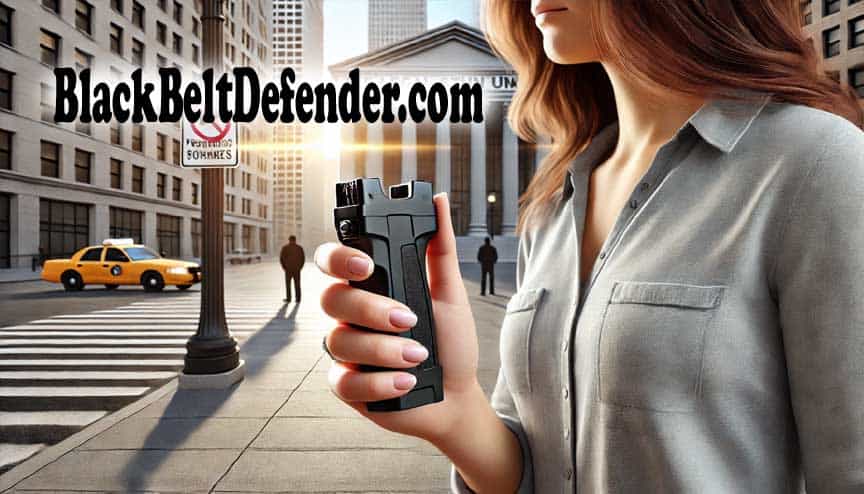
free shipping on orders over $49
We're having a 15% off sale on all our products. Enter your email below to be notified about future sales.




Yes, you can legally possess stun guns or stun batons infor self-defense, and you don’t need a special permit for it. You must be at least 18 years old to own one. While you’re allowed to openly carry a stun gun, carrying one concealed requires a permit. Be mindful not to bring your stun gun to off-limits places like schools or courthouses. If you’re convicted of certain crimes or under a domestic violence protective order, owning a stun gun is off the table. Always use it with reasonable force against an immediate threat. There’s more for you to grasp to ensure you’re within the law.
Stun guns such as the Master Blaster 95 Million volt Stun Gun, recognized as electronic incapacitation devices in Pennsylvania, deliver an electric shock to stop attackers in their tracks. These weapons provide a non-lethal means of defense, allowing you to protect yourself without causing permanent harm.
Under Pennsylvania law, you’re permitted to possess such devices for self-defense purposes, giving you a legal way to safeguard your personal safety.
You don’t need a special permit to carry a stun gun or Taser in Pennsylvania, making it important for you to equip yourself with these defense tools. However, it’s essential to remember that when you’re using a stun gun, you must apply a reasonable amount of force. This means you can only deploy these devices when you’re directly threatened or to protect your property from an intruder.
The law specifies that these electronic incapacitation devices shouldn’t be used recklessly but rather as a measured response to an immediate threat.
While understanding how stun guns operate and their legal status in Pennsylvania is important, it’s equally essential to know who can legally possess these devices. In Pennsylvania, stun guns are legal, and you don’t need a permit to own or openly carry one. However, there are specific criteria you must meet to make sure you’re within the law.
Here’s a quick guide to help you navigate the legal possession criteria for stun guns in Pennsylvania:
| Criteria | Requirement | Details |
|---|---|---|
| Age Requirement | 18 years old | You must be at least 18 to purchase and possess a stun gun. |
| Permit for Concealed Carry | Required | A permit is necessary for concealed carry of a stun gun. |
| Open Carry | No permit required | Stun guns can be openly carried without a permit. |
| Off-limits Areas | Yes | Carrying stun guns in places like courthouses and schools is prohibited. |
| Purchase | No permit required | You can purchase a stun gun without a permit, but age verification is needed. |
Understanding who can’t legally possess stun guns in Pennsylvania is essential for making sure you’re following the law. If you’re a convicted felon or have a record of specific misdemeanors or felonies, you’re barred from owning a stun gun. This restriction is part of state regulations designed to promote public safety. Additionally, individuals with domestic violence convictions find themselves in a similar situation, unable to legally possess these self-defense tools.
The law in Pennsylvania takes a firm stance against allowing stun guns in the hands of those deemed incompetent by the court. If you’ve been declared incompetent or involuntarily committed to a psychiatric institution, you must understand that owning a stun gun is off-limits for you. Similarly, if you’re under a domestic violence protective order, the state requires you to relinquish any stun guns you own, aligning with efforts to protect victims of domestic abuse.
Residents need to recognize these regulations and make sure they’re not in possession of stun guns if they fall into any of these prohibited categories. Compliance isn’t only about adhering to the law but also about contributing to a safer community for everyone.
To guarantee you’re within the law, it’s critical to know how and when you can use a stun gun for self-defense or protecting your property in Pennsylvania.
Stun guns like the SAL 95 Million volt Stun Gun with Alarm and Flashlight are a viable option for self-defense, but you must adhere to strict usage guidelines to avoid legal consequences. You’re allowed to use them with reasonable force in situations where you feel your safety or your property is at risk. However, wielding a stun gun in a threatening manner outside these scenarios can lead to assault or even felony charges.
Remember, misuse of stun guns for purposes other than self-defense is strictly prohibited. The law is clear that prohibited individuals, including convicted felons or those subject to Protection From Abuse orders, can’t possess stun guns under any circumstances. If you fall into these categories, steering clear of stun guns is non-negotiable to avoid severe penalties.
Following the usage guidelines diligently ensures you stay on the right side of the law while protecting yourself and your property. It’s not just about having the means for defense but also knowing the boundaries of its use to prevent unnecessary legal entanglements.
Staying current with changes in Pennsylvania’s stun gun laws is essential to guarantee you’re always compliant. Given that Pennsylvania law allows most residents to own and carry stun guns without a permit, it’s important to understand any legal changes and updates regarding stun gun regulations. This knowledge ensures you manage the nuances of ownership responsibly and within legal boundaries.
To adeptly manage the evolving landscape of stun gun legality, you must stay informed about modifications in laws or regulations related to stun guns in the state. This vigilance helps preempt any inadvertent violations that could arise from outdated information. Consulting local law enforcement or legal experts offers a reliable method for guidance on understanding stun gun legality in Pennsylvania. These professionals provide insights into the specific laws and restrictions surrounding stun guns, ensuring your lawful possession and use.
In Pennsylvania, you’re legally allowed to use pepper spray, Tasers, and certain martial arts weapons for self-defense. The state’s laws also permit carrying defensive flashlights, personal alarm systems, and legal knife types for protection.
Stun guns like the 25M Volt Rechargeable Lipstick Stun Gun With Flashlight deliver an electric charge through direct contact, while Tasers shoot prongs for distance incapacitation. Different voltage levels, safety mechanisms, and usage training impact their physical effects and public perception. Both offer non-lethal alternatives.
You don’t need a license to carry a Taser around, but you should be aware of age restrictions, public places rules, and usage guidelines. Always consider legal consequences and possibly taking a safety course.
You can’t bring a stun gun in your carry-on due to TSA guidelines. To avoid trouble at security checkpoints and guarantee travel safety, pack it in checked luggage, following airport security policies and luggage packing strategies.
As always, be safe and be prepared.
See Also:
Black Belt Defender
1867 Caravan Trail #105
Jacksonville, FL 32216-2006
Call us toll-free: (800) 859-5566
Mon-Fri: 9:00 am – 5:00 pm EST
NH based, FL Warehouse
Online Orders: 24/7/365

